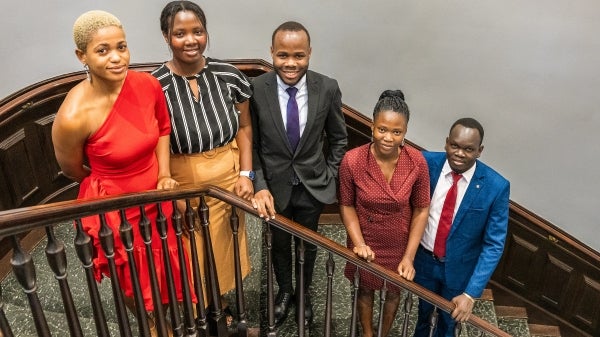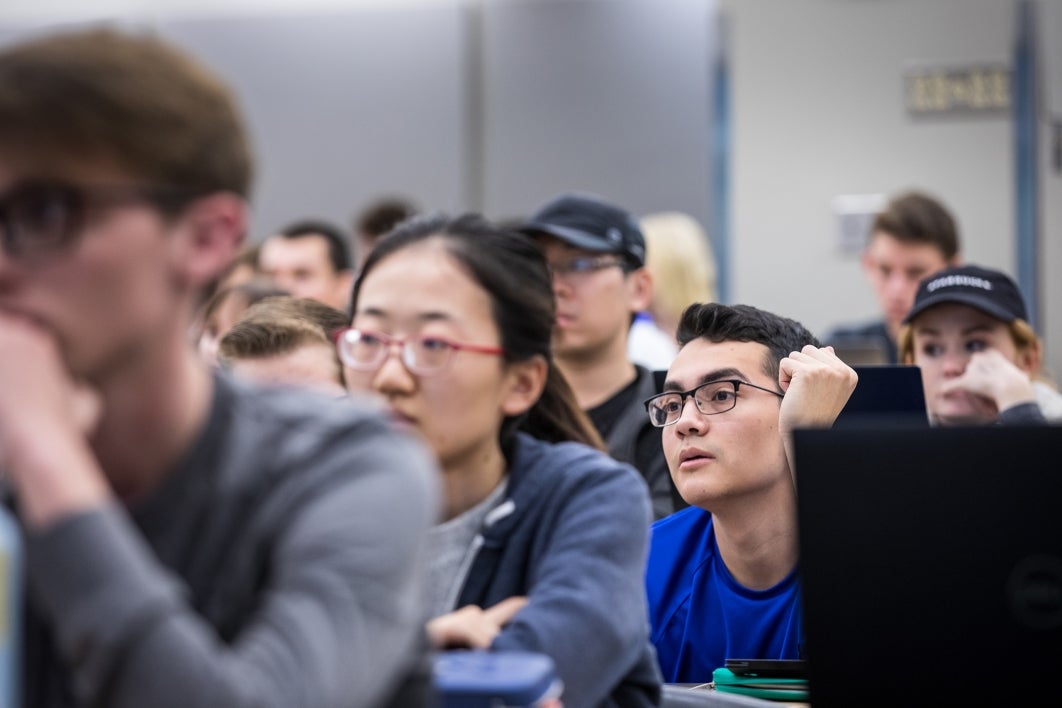Former treasury secretary tells ASU students: ‘Aspire to make every moment count’

Larry Summers, the Charles W. Eliot University Professor and president emeritus at Harvard University who served as the 71st secretary of the treasury for President Bill Clinton and the director of the National Economic Council for President Barack Obama, at the W. P. Carey School of Business on Feb. 19. Photo by Charlie Leight/ASU Now
Many economics students with big dreams aspire to boost the country’s economy.
Former Treasury Secretary Larry Summers wants them to aspire to make every moment count.
“I’ve worked hard and I’ve got stabilities in some things but, overwhelmingly, I’ve been lucky,” said Summers, president emeritus of Harvard University, during a Q&A with economics students at Arizona State University's W. P. Carey School of Business on Feb. 19.
“If I’ve learned anything, it’s that all kinds of things you do when you think it doesn’t matter, turn out to matter a great deal,” he said.
To illustrate, Summers, who continues to teach economics at Harvard, shared a story about how he helped one of his students who wasn’t good at economics pull an all-nighter cramming for a test “at a moment when he might have failed. I did it because he was a nice guy and it seemed like the right thing to do,” he said.
Six years later, that student Summers helped was good at politics as the deputy campaign manager of a presidential campaign, and the candidate needed an economic adviser. And that’s how Summers got to work on a presidential campaign in 1988.
“I got an opportunity that got me started. In the long run, things I did when I didn’t think it would matter turned out to be hugely important. So make every moment count. It always matters.”
During his hourlong visit, students asked Summers questions about a broad range of topics from whether he’s concerned about the budget deficit to his position on the wealth tax.
When asked about the most relevant macroeconomic issue that should concern undergraduate students today, Summers said, “the relatively slow growth of the U.S economy and, in particular, the living standards of low-income people.”
Summers, who served as Bill Clinton’s treasury secretary and as the chief White House adviser to President Obama on the development and implementation of economic policy, encouraged the students to figure out how to have an economy that’s more dynamic, more investment-oriented, and fairer in the distribution of rewards.
In response to a question asking how should students take advantage of educational opportunities, he said, “Increasingly in the modern world, strategy is about building on strengths not about compensating for weaknesses. You see it in football where there’s a specialist for the punt return, a specialist for the kickoff return, whereas not very long ago there were just returners. You see it in economics when there used to be macroeconomists and microeconomists and now there are macro labor economists and micro labor economists.”
As one of America’s leading economists, Summers said the payoff is to be the best at something, to be the answer to some question that someone may have, or possess the expertise to answer the question.
“The people who end up a little disappointed are those who try to do whatever everybody else is doing and to be pretty good at it and to fit in and conform. The people who do better are those who figure out something they care about — Scandinavian banking or the economics of tropical forests to name a few random examples in economics — and become very good at it and the answer to that question. Then they’re not just another resume in the pile. They’re not just another person with a college degree and good grades. They’re somebody who has distinctive expertise that most other people don’t have.”
With a tenure at the U.S. Treasury coinciding with the longest period of sustained economic growth in U.S. history and the only treasury secretary in the last half-century to have left office with the national budget in surplus, Summers said he’s concerned with the budget deficit.
“Would I prefer that we had less debt, yes," he said. "Always in evaluating debt, you have to look at what it’s being used to pay for. If it’s being used to pay for medical care for poor people, if it’s being used to pay for making college more affordable, if it’s being used to pay for a better infrastructure for our country, then it’s all a very good thing. If it’s being used to pay for large tax cuts for people and companies that have already done the best in the country, then I’m not sure that was such a good thing to borrow for.
“Calibrate your concerns for whether the borrowing is for productive investment or for much less productive uses of resources.”
Summers, who was also former vice president of development economics and chief economist of the World Bank, was asked about secular stagnation, a term he’s recognized for reviving from Depression-era economist Alvin Hansen. It’s “a prolonged period in which satisfactory growth can only be achieved by unsustainable financial conditions — and may be the defining macro-economic challenge of our times.”
Economics students listen to Larry Summers, who has had a profound effect on politics, economics and education in our country, at ASU's W. P. Carey School of Business on Feb. 19. Photo by Charlie Leight/ASU Now
He told students that the wealth tax has all kinds of problems.
“When we need to raise revenue, given the equality in the United States, we should raise it from people who have a lot rather than from those who have a little,” Summers said. “I believe we’re underinvesting in this country. It’s wrong that we don’t have some kind of universal support for 3-year-old children. It’s wrong that airports in the United States look pathetic compared to airports in China and France or England or Japan. It’s wrong that we’re facing what may be the greatest catastrophe humanity has ever faced in the form of climate change, and we’re not spending half as much on energy-related research and development as we were 25 years ago as a country.
"We need more revenue and it needs to come primarily from those with high incomes. But there are better ways to get it. We have cut the rate at which the IRS audits millionaires in half since 2010. Tax cheating — not paying the taxes you owe — by people with incomes over a million dollars will cost us as a country several trillion dollars over the next 10 years. That’s where we ought to start looking for revenue.”
A student asked Summers what’s the most destructive misunderstanding about economics in this country. “I think that a major misunderstanding that comes up in many different contexts is what economists call the fallacy of composition, the idea that what’s true for one person is true for a group as a whole,” he said.
“Imagine 70,000 people in a football stadium. If any one of them stands up, he will see better. If everyone stands up, no one will see better and everybody will be less comfortable. Going from the experience of one to the experience of many is misleading.
"If any one of you runs to the door to get out of this room, you will get out faster. If everybody in this room tries to runs for the door, the result will be chaos, a lot of people knocked over, and slower movement. There are many examples in economics that have that parable.
"If one person saves, it’s probably going to be good for that person building up wealth. But one of the first things we learned in macroeconomics is that my spending is your income. The sum of all spending has to equal the sum of all income. If everybody tries to save, the result will be that everybody will have less income and then there will be less economic activity and, ultimately, with lower income, there’ll be less saving.”
Also, Summers said there’s a widespread misconception that we can control and override market forces.
He closed his presentation with a message directed toward the students. “I’m glad and excited to be here at Arizona State University. I’ve followed over time what’s happening at the school in terms of dynamic energy, social commitment and the willingness to change and evolve to be better. ASU in many ways is an example for universities across the country, and so I’m envious of your opportunity to be young and have a chance to study at a university as dynamic as this one.”
More Business and entrepreneurship

Cohort of Mastercard Foundation Scholars poised to become AI leaders in Africa
Arizona State University is celebrating a significant milestone in expanding the university’s global access mission by welcoming…

Networking event turns pitches into partnerships
Perfect timing, quick decisions and electrifying energy are vital aspects of both startup ventures and auctions. In an…

Thunderbird at ASU, W. P. Carey School team up on concurrent master's degrees
Students are now able to take advantage of two world-class schools at Arizona State University, at the same time. The…
